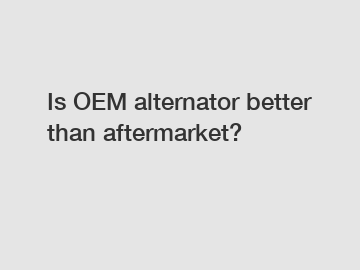Is OEM alternator better than aftermarket?
Is OEM Alternator Better Than Aftermarket?
When it comes to replacing a faulty alternator in your vehicle, one question that commonly arises is whether an OEM (Original Equipment Manufacturer) alternator is better than an aftermarket one. This is an important decision to make, as the performance and longevity of your vehicle's electrical system can depend on it. In this article, we will explore the advantages and disadvantages of each option, helping you make an informed choice.
1. OEM Alternators: Reliability and Compatibility.

OEM alternators are manufactured by the same company that originally made the alternator for your vehicle. These alternators are built to meet the specific requirements and specifications of your vehicle, ensuring proper compatibility. They are designed to integrate seamlessly with your vehicle's electrical system, providing reliable and consistent performance. OEM alternators also usually come with a warranty, giving you additional peace of mind.
2. Aftermarket Alternators: A Wider Range of Options.
Aftermarket alternators are produced by companies other than the original manufacturer of your vehicle. While they may not have the same level of compatibility and reliability as OEM alternators, aftermarket options often offer a wider range of choices. This means you may have more options in terms of price, performance, and features. Aftermarket alternators are also typically more readily available, making it easier to find a replacement quickly.
3. Quality and Price Considerations.
One of the primary concerns when purchasing an alternator is its quality. OEM alternators are generally known to offer a higher level of quality control because they are produced by the original manufacturer. This can ensure a longer lifespan and better performance. On the other hand, aftermarket alternators can vary in quality. While some aftermarket alternators can match or even exceed the performance of OEM alternators, others may fall short.
Additionally, the price can play a significant role in the decision-making process. OEM alternators are usually more expensive compared to aftermarket options. If you have budget constraints, an aftermarket alternator might be a more affordable choice. However, it is crucial to consider the long-term costs. A higher upfront cost for an OEM alternator may be offset by its longevity and durability, ultimately resulting in potential savings down the line.
4. The Importance of Professional Installation.
Regardless of whether you choose an OEM or aftermarket alternator, proper installation is crucial for optimal performance and to avoid further damage to your vehicle's electrical system. It is highly recommended to have a qualified technician install the alternator to ensure correct installation and prevent any potential issues.
In conclusion, the decision between an OEM alternator or an aftermarket one depends on various factors. If you prioritize reliability, compatibility, and warranty, an OEM alternator might be the better choice. However, if you require a wider range of options and have budget constraints, an aftermarket alternator could be a viable alternative. Whichever option you choose, remember to have it installed by a professional to guarantee the best results.
If you have any further questions about OEM alternators, aftermarket options, or need professional installation, please feel free to contact us. Our dedicated team is here to assist you and provide you with the guidance you need.
Contact us to discuss your requirements of oem mitsubishi starter, starter motor manufacturer, oem mitsubishi starter. Our experienced sales team can help you identify the options that best suit your needs.

Comments
0